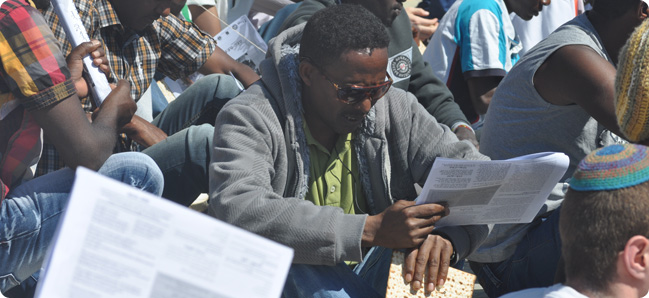
In the spirit of freedom that characterizes the holiday, NIF was one of the sponsors of a special Seder held just outside Holot Detention Facility in the Western Negev, where African refugees are now incarcerated. The participants included hundreds of detainees, their compatriots from the rest of the country, and a large number of Israeli activists.
Around 1,800 people are currently held at Holot. They are technically allowed to come and go, but they are required to report for roll call three times a day, or they are sent to prison.
A special Seder for the African community has taken place every year since 2007; this was the first time it has been held at one of the facilities built to detain asylum seekers. The purpose of the event was to draw parallels between the Passover story and the current experiences of Africans seeking asylum in Israel.
Musa Abdulaye, a board member of NIF grantee ARDC, said: “Passover commemorates the Jews’ escape from a dictator. We decided to do this event in Holot to remind them what happened; people who went through the same thing are being put in prison and labeled as criminals. If we keep pushing this, then the Supreme Court will repeal this law and release these Africans. It’s important to show solidarity with the people in prison, to show them that they’re not alone.”
The Seder featured matzah, a communal meal, music, drama performances, and speeches by Africans and Israelis.
Among the speakers was Rabbi Susan Silverman, who told the crowd that “every single person in this country who sits down to a Passover Seder has to say to themselves, ‘Am I taking care of the stranger among us right now?’ Everyone’s got to look around and see what we are doing with the strangers in our own country.”
Jack, an asylum seeker from Darfur who has spent two months in Holot, said: “Life here is unimaginable. We live in a prison. It will take us five hours to get back in after this. The Seder is spiritual. It’s good that people are becoming aware and are getting involved. They need to learn that we’re good people.”
Another speaker was Mutasim Ali, executive director of ARDC, who came to Israel five years ago. “We’ve brought Israelis here so they can hear the stories,” he said. “Only Israelis can change the policy. They have to understand why people escaped.”
Ali himself has been ordered to report to Holot on May 5th, and a hearing against the legality of his being jailed without a hearing and without explanation will be held later in May.
In response, Ali said: “I know that the policy of the government is to place Eritreans and Sudanese in prison, but it’s not fair that they send people to prison and don’t allow them to present their [asylum] claims. Our problem is not just with Holot, but with the entire policy of the state toward refugees. I will accept what the court decides, but I still have hope that things will change.”
Ali is being represented in his appeal by ARDC and the Hotline for Refugees and Migrants, another NIF grantee. In addition, in response to a petition by a number of NIF human rights grantees, the Supreme Court will rule later this year on the legality of the broader policy of sending asylum seekers to Holot.
